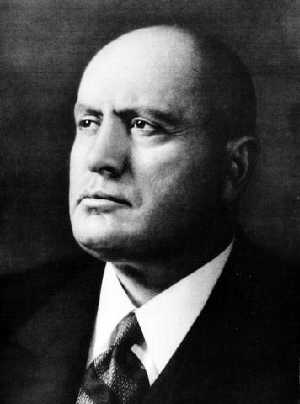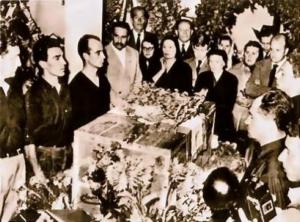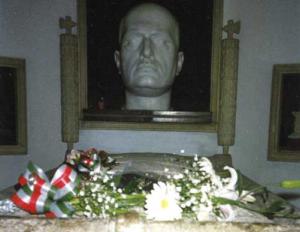 SKC Films Library SKC Films Library |
| SKC Films Library >> General and Old World History >> Italy >> United Italy (Monarchy), 1871 - 1947 |
| Benito Mussolini dictator of Italy
Benito Amilcare Andrea Mussolini was born in Dovia di Predappio, Italy, on July 29, 1883. His father Alessandro was a blacksmith with Socialist leanings; his mother Rosa was a Catholic schoolmistress. The family eventually included another son (Arnaldo) and one daughter Edvige). At the age of 14, after completing his basic education in Predappio, Mussolini was sent to a boarding school run by Salesian monks in Faenza. Expelled by the monks for bad conduct, he entered a normal school at Forlė, from which he earned a teaching certificate in 1901. He subsequently became an elementary teacher, but he did not enjoy the work and left after about a year. Socialist In June 1902, Mussolini moved to Switzerland, where he earned a living as a bricklayer. He also became active in the Socialist movement, working for its local newspaper, organizing meetings, giving speeches to workers, and serving as secretary of the Italian workers' union in Lausanne. In 1903, he was arrested and deported to Italy for advocating a general strike, but he snuck back into Switzerland rather than report for mandatory military service in Italy. Arrested for falsifying his papers in 1904, he was once again deported to Italy. This time he chose to perform his military service, which was completed in 1907, after which he returned to teaching. In February 1909, Mussolini moved to Trent, Austria (now Trento, Italy), where he became the secretary of the local labor party. He also became editor of the local Socialist newspaper and wrote several literary works. Expelled from Trent later that year for publicly supporting Italian claims to the city, he went first to Milan and then, in 1910, became the editor of a Socialist newspaper in Forlė. In that same year he married Rachele Guidi, who bore him five children. By 1911 Mussolini was one of the most prominent Socialists in Italy. In September of that year he led demonstrations against an Italian attack on Tripoli, Libya, for which he was arrested and imprisoned for five months. In April of 1912, he became editor of Avanti, the leading Socialist newspaper in Italy. Under his leadership the paper's circulation rose from 20,000 to 100,000. In 1913 he published Giovanni Hus, il veridico (Jan Hus, true prophet), an historical and political biography about the life and mission of the Czech ecclesiastic reformer Jan Hus, and his militant followers, the Hussites. The Italian Socialist Party supported World War I when it first began, but renounced that support after a number of anti-war protestors were killed. Mussolini believed that Italy should enter the war against Germany, however, and, on November 25, 1914, he was expelled from the Socialist Party for repeatedly advocating that position. He immediately founded his own newspaper, Il Popolo d'Italia, in which he published violent editorials aimed at driving Italy into the war. When Italy finally did enter the war, he enlisted in the army and became a Corporal, and served in the trenches from September 1915 until being wounded in February 1917. Rise to Power On March 23, 1919, Mussolini and a group of discontented war veterans created the Fasci Italiani di Combattimento (Italian Combat Squad), in Milan. The nationalistic, antiliberal, and antisocialist Fascist movement easily attracted support from the lower middle-class. Spreading out into the countryside, the movement also attracted support from landowners. Those who did not support the Fascist movement were often "bullied" by armed squads known as Black Shirts. By 1922 the Fascists had become so powerful that, on October 28, King Victor Emmanuel III was forced to call on Mussolini to head the government. As Prime Minister, the first years of Mussolini's rule were characterized by a right-wing coalition government composed of Fascists, nationalists, liberals, and two Catholic clerics from the Popular Party. By 1925 he had transformed Italy into a single-party, totalitarian regime, with himself as Il Duce (dictator). Under Fascism, employers and workers were organized into party-controlled groups representing different sectors of the country. Although the system preserved capitalism and expanded social services, it also abolished free trade unions and the right to strike. Mussolini also instituted a system of industrial holding companies financed by the state. Although Mussolini never embraced Catholicism and had even outlawed Roman Catholic youth organizations, he ended a half-century of friction between the Church and the State by signing an agreement with Pope Pius XI that gave the Pope temporal powers within Vatican City (the Lateran Pacts, 1929). Believing that Italy should reclaim the glory of the Roman Empire, Mussolini adopted an aggressive foreign policy. His securing of Italian colonies in Libya and Somalia won him popularity, but his brutal invasion of Ethiopia in 1935-36 brought condemnation from the League of Nations. His popular support began waning after he sent military forces to assist Spanish rebel leader General Francisco Franco (1936-39), allied Italy with Nazi Germany, enacted anti-Jewish laws, and invaded Albania (1939). World War II Mussolini's aggressive foreign policy left Italy militarily unprepared to fight alongside Adolf Hitler, so after war was declared in September 1939 Mussolini declared that his country was a non-belligerent. It wasn't until June 1940, after Germany had conquered most of France, that he officially joined the Axis Powers, by invading southern France. Italian troops fought the British in Africa and alongside German troops in Yugoslavia and the Soviet Union, but were defeated in almost every battle they fought. After Italy's many military defeats, King Victor Emmanuel dismissed Mussolini on July 25, 1943, and in September signed an armistice with the Allies. Initially imprisoned by his own Fascist Grand Council, Mussolini was rescued by German paratroopers in September and made head of a puppet government in northern Italy. After German forces in northern Italy collapsed in the spring of 1945, Mussolini attempted to flee to Switzerland with his mistress Clara Petacci. The two were captured and killed by the Italian underground at Guilino di Mezzegra near Lake Como on April 28, 1945. After Mussolini’s corpse was hung up on meat hooks on April 29, 1945, in Piazzale Loreto in Milan, where citizens vented their fury at their former leader, he was buried in an unmarked grave in a nearby cemetery. A year later, neo-Fascist loyalists dug up his body and hid it in a convent in Lombardy until 1957, when the remains were returned to Mussolini’s widow, who on September 1 buried them in the family crypt in Predappio. PRINT SOURCE WEB SOURCES SEE ALSO |
| SKC Films Library >> General and Old
World History >> Italy >> United Italy (Monarchy), 1871 - 1947 This page was last updated on June 10, 2017. |


